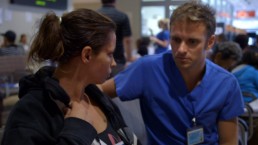Director Ryan McGarry of ‘Code Black’
"For a typical emergency department, one of these patients over one shift would be a big deal. Here, you’d have six of them pretty much every hour. Right off the bat I was visually overtaken by it all."
 [soundcloud url=”https://api.soundcloud.com/tracks/156176871″ params=”color=ff5500&auto_play=false&hide_related=false&show_comments=true&show_user=true&show_reposts=false” width=”100%” height=”100″ iframe=”true” /]
[soundcloud url=”https://api.soundcloud.com/tracks/156176871″ params=”color=ff5500&auto_play=false&hide_related=false&show_comments=true&show_user=true&show_reposts=false” width=”100%” height=”100″ iframe=”true” /]
The Code Black press day was held in one of the most unique places I’ve ever conducted an interview. Sitting among gurneys and medical supplies, I had the chance to talk to doctor-turned-director Ryan McGarry about his debut documentary Code Black at the Los Angeles County Hospital. One of the main focal points of the film is the importance of the infamous “C-Booth,” where it’s a close call between life & death, and that’s exactly where we’re sitting now. With a history that is both eerie and gratifying, it’s the perfect spot to talk. We begin:
BEING IN “C-BOOTH” RIGHT NOW IS AWESOME. SINCE YOU’VE UPGRADED HOSPITAL BUILDINGS AND NO LONGER WORK HERE, WHAT’S BECOME OF THIS SPACE?
RYAN MCGARRY: Yeah, this is a fairly expensive state-of-the art training facility. All these mannequins [he points to a dummy on a gurney] are like robots and they can, like, throw up on you.
OH…
Yeah there’s a whole jug of blood over there.
CAN YOU REMEMBER THE FIRST TIME YOU WERE HERE? WHAT WAS THAT MOMENT LIKE FOR YOU?
Oh I almost shit my pants! I was a new, I was a rotating medical student and people are always shocked like when you join a team in medicine… there isn’t much “corporate” orientation. You would expect there to be this four-week long [training period], like ‘here’s every nob and button.’ Nope! You just get thrown in! Normally, that’s already pretty tough, but in this environment, that was insane.
To give you an idea, this base would have six beds. For a typical emergency department, one of these patients over one shift would be a big deal. Here, you’d have six of them pretty much every hour. Right off the bat I was visually overtaken by it all.
AFTER GOING THROUGH THE PROCESS OF MAKING CODE BLACK, WHAT WOULD YOU SAY IS HARDER- BEING A DOCTOR OR BEING A DIRECTOR?
Wow… I think they’re eerily, exactly the same. Thank goodness, I think there’s some overlap. I will say in directing if your crew, editor, producers, etc., sense that you’re creatively cornered, you don’t know the answer, they know that and you can tell right away that your team is starting to doubt. Same thing with your nursing staff, if you’re running a case and you’re in a rock and a hard place and you don’t know the way out of that, you can’t let people know that. You have to be able to negotiate that problem solving internally without letting that guard down and I think that’s an incredible, eerily weird exact similarity between the two.
HOW DID YOU FIND THE DOCTORS YOU PROFILE?
They’re my friends. There is no lack of characters here; I could have cast the film five different ways. Here, you have a pretty unique set of physicians who really know that they’re taking a harder path than they have to. There are easier places to train and work, so it’s already a unique question of ‘wait, why are you doing this?’ ‘Why are you choosing to make this 100 times harder than it has to be?’
I’M SURE YOU’VE BEEN ASKED THIS QUESTION A LOT, BUT WHAT WAS THE REASON FOR MAKING THIS FILM IN THE FIRST PLACE?
There’s no simple answer to that because it kind of grew up with me. When I first was here [at L.A.C.H.] it was shock and awe. I thought this would be an amazing thing to capture because it’s so intense. And then the question of ‘why does intensity matter’ became the real reason for the film.
WERE YOU WORKING AND SIMULTANEOUSLY MAKING THIS FILM?
Yeah…
WERE YOU SLEEPING?
No. Haha, I’m still kind of digging out of that. I had no vacation; any time that I had off went to the film or to the edit room. I was already working a lot and then obviously a film is a pretty big undertaking as well.
OH I’M SURE. IT DID REALLY WELL AT FESTIVALS!
Yeah! It won the jury prize for best documentary [Los Angeles Film Festival 2013] and then we were fairly undefeated following that in festivals around the country.
DID YOU EXPECT THAT?
No! No I thought it was going to be a disaster. I thought I was going to be the a**hole who made this film as he’s graduating residency about a hospital that already takes its’ share of knocks in the press.
YOU WORK AN INTENSE JOB; DO YOU HAVE A MORNING MANTRA?
I do try to remind myself that I am very lucky to be in this role. The problem is, sometimes you’re exhausted, you’re working every night, and sometimes there are things that are frustrating about the process… I think the battle for every physician in that kind of environment is getting some sort of renewal. I chose to make a film, and that’s [renewal] for me. I think that when I feel myself coming away from that humanity moment, I go, ‘wait a second, I did make a film about this.’
DO YOU HAVE ANY PLANS FOR ANOTHER FILM?
Yes! Code Black has been auctioned for a TV series, a narrative fiction series, so that’s in development. My co-writer, Josh Altman, and I have a few other projects in the pipeline and in the meantime I’m directing commercials.
ALL THAT, PLUS BEING A DOCTOR?
Yeah.
WOW!
Yeah, actively working!
Morgan Rojas
Certified fresh. For disclosure purposes, Morgan currently runs PR at PRETTYBIRD and Ventureland.

